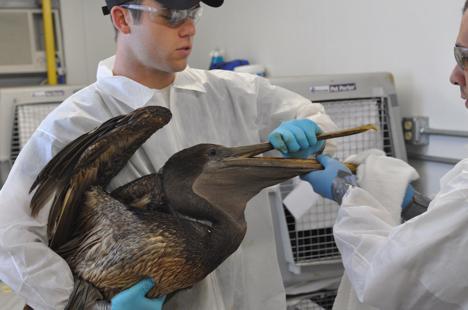The oil spill in the Gulf of Mexico is one of the biggest environmental disasters in modern history. After 3 months the oil spill has stopped, but during that time over 205 million gallons of oil has been released into the Gulf. In my WhyReef BBS, Pygmygoat asked how this oil spill hurts coral reefs and how she can help. I am sure many other Whyvillians are thinking the same thing, and I hope these articles answer your questions.
Oil is very toxic. Contact with oil, such as physically touching oil or eating oil, can kill marine life. In the Gulf hundreds of sea turtles, sea birds, fish and crabs have been found covered in oil. The harm to these animals is easy to see, but there are also long-term effects that will take time to appear - such as the impact of oil on the marine food web.
All of this oil could harm coral reefs. There is a loop current that could bring oil from the Gulf of Mexico to the coral reefs in Florida and the Caribbean. In the short-term oil can kill coral, and in the long-term oil harms coral growth, reproduction, and behavior. As many of you have seen from the WhyReef Food Web Games and Reef Simulator, coral is the base of the reef food web and when coral is destroyed almost all reef species suffer.
Dr. Rudiger Bieler, Curator and Head of Invertebrates at The Field Museum in Chicago, studies snails and clams that live in coral reefs in Florida and the Caribbean. Right now he is working in the Caribbean, and when he returns next week I will interview him about how the oil spill is affecting the reefs there. If you have a question for Dr. Bieler please post it in my "Ask Mark BBS" in the Reef Station and I will ask him!
This oil spill is a huge environmental disaster, but thousands of people are helping to clean it up. Visit the Global Action Atlas (http://actionatlas.org/custom/index/id/pa34BFC3972923729889) to find ways that you can help. Look for the next article, "The Gulf Oil Disaster Part 2", to find more ways to help the ecosystems affected by the oil spill.
Many sea birds, like this pelican, have been found covered in oil but people are working hard to clean and treat them.

Author's Note: References:
Picture - Copywrite U.S. Coast Guard photo by Petty Officer Caleb Critchfield (www.deepwaterhorizonresponse.com)
http://environmentalism.suite101.com/article.cfm/the-gulf-oil-spill-environmental-threat-to-florida-coral-reefs
http://www.cnn.com/2010/US/08/03/gulf.oil.largest.spill/
http://www.edf.org/page.cfm?tagID=54954